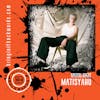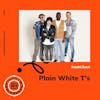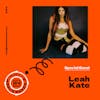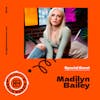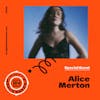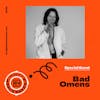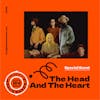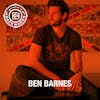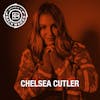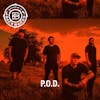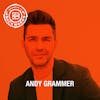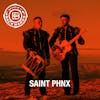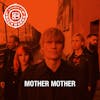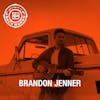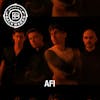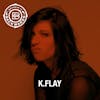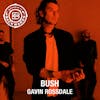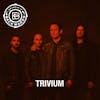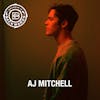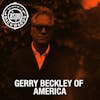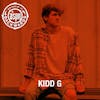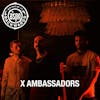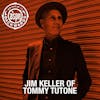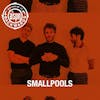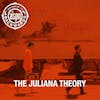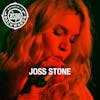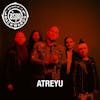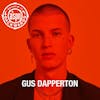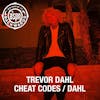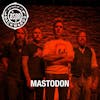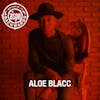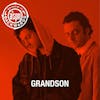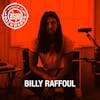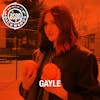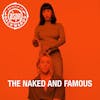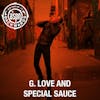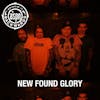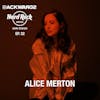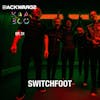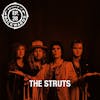Interview with Spencer Brown & Marieme
We had the pleasure of interviewing Spencer Brown & Marieme over Zoom video!
Spencer Brown launched his own record label, diviine, earlier this year to release whatever music type he wanted, when he wanted, without restrictions. The label's debut...
We had the pleasure of interviewing Spencer Brown & Marieme over Zoom video!
Spencer Brown launched his own record label, diviine, earlier this year to release whatever music type he wanted, when he wanted, without restrictions. The label's debut double single ‘Forbidden Flow / 18 Min Loop’ featured a song that clocked in at, you guessed it, 18 minutes. While the initial release was geared towards the club, Spencer further demonstrates the zeitgeist of diviine with the follow-up up release ‘Stuck/Reflex,’ two beautiful songs that feature vocals from Senegalese-American singer-songwriter, Marieme.
A favorite of top lifestyle publications including V Magazine and FLAUNT, Marieme’s sultry, smooth and soulful touch is at the core of what makes this unique collaboration so special. ‘Stuck’ is a flowing, ethereal slice of progressive house while ‘Reflex’ is built around a traditional songwriting structure, allowing Marieme to tell her story unaccompanied by beats until the very end.
Spencer is an artist who likes to live on the cutting edge of dance music without being boxed into any genre. Whether it be techno, deep house, progressive house, or a whopping 18-minute stormer, Spencer creates what he wants, when he wants, for the love of music. Throughout his career, he’s explored the label system, never bound to any organization, but choosing world-class imprints such as Anjunadeep, Last Night on Earth, Factory93, and mau5trap to release his diverse work. It’s now time for Spencer to take the next step in his career and launch his own label...a place for dance music without any boundaries…this is diviine.
Spencer Brown’s ‘Stuck/Reflex’ is now available across all digital platforms.
div002 Tracklist
Stuck
Reflex
We want to hear from you! Please email Tera@BringinitBackwards.com.
www.BringinitBackwards.com
#podcast #interview #bringinbackpod #SpencerBrown #Marieme #Reflex #Stuck #NewMusic #zoom
Listen & Subscribe to BiB
https://www.bringinitbackwards.com/follow/
Follow our podcast on Instagram and Twitter!
https://www.facebook.com/groups/bringinbackpod
We'd love to see you join our BiB Facebook Group.
What is going on?! It is Adam. Welcome back to bringing it backwards. A podcast where both legendary and rising artists tell their own personal stories of how they achieve stardom. On this episode, we had a chance to hang out with both Merriam and Spencer brown over zoom video, both Merriam and Spencer brown. Talk about where they were raised, how they got into music, both come from two totally different backgrounds. Merriam grew up in Senegal and moved to New York when she was seven years old, but due to her religious household, she was not allowed to sing. She didn't start singing really until she was 27 years old and moved to Los Angeles. She talks about how she got her big break with universal music with the song she wrote called leave. 5 (1m 58s): We also hear about Spencer's upbringing. He started playing music at a very early age, two years old, his parents got him a drum kit. Then he picked up guitar and bass was recording full songs that he was playing all by himself. All the instruments by eight around 12 is when he got into production and deejaying. He talked about how one of his songs landed in front of a Vici who was playing the song on his podcast. And that opened up many doors for him. He was also touring with Vici, his, I think freshmen and sophomore year of college. So we hear about that. The success of his first album, a couple of number one hits that he had that really changed everything for him. We also learn how Merriam and spent around, met each other and all about the new record that they worked on together. 5 (2m 44s): It's an EAP called stuck reflex. You can watch our interview with Merriam and Spencer brown on our Facebook page and YouTube channel at bringing it backwards. It'd be rad if you subscribe to our channel like this on Facebook and follow us on Instagram, Twitter, and Tik TOK at bringing back pod. And if you're listening to this on Spotify, apple music, Google podcasts, it would be amazing if you follow us there as well, and hook us up with a five-star review. 6 (3m 12s): We'd appreciate your support. If you follow and subscribe to our podcasts, wherever you listen to podcasts, 5 (3m 18s): We're bringing it backwards with Merriam and Spencer brown. I appreciate you being here. 7 (3m 24s): Yeah. Thanks for having us. It's 5 (3m 27s): Of course, this is about you both and your journey in music and how you got to where you are now. 7 (3m 33s): Awesome. 5 (3m 34s): And of course, we'll talk about the record you put out as well. 8 (3m 38s): That's amazing record. 5 (3m 40s): I love it. I love it. I was just listening 8 (3m 41s): To, 5 (3m 43s): I like stuck. It's a little more upbeat. 7 (3m 46s): Yeah, for sure. I mean, 5 (3m 48s): Yeah. I mean, reflex is it, they're both awesome songs, but the other one starts a little slower. I was, I was jamming to the first one 8 (3m 57s): Is more like an instant impact. 5 (3m 59s): Exactly. 8 (4m 0s): Reflexes. Like you got to sit and cry, 5 (4m 4s): But it builds up. It does build up halfway through, I mean, in the middle of the song. 8 (4m 8s): Yeah. 5 (4m 9s): Awesome. Awesome. Well, cool. Well, I appreciate again, you both being here, let's start with you, Mary. And where were you born and raised? 8 (4m 17s): I was born in Mauritania when I was six months old and my parents took the last plane out of Mauritania and flipped, fled to Senegal. My parents are Senegalese and Mauritanian too, because there was a war between Senegal Mauritania. So I was raised in Senegal till I was seven years old. And then I moved to the Bronx and it sort of brought in the Bronx and most of my life and I'm here. 5 (4m 41s): Yeah. So you okay. You're, you're there instead of called to your seven. Is that what you said? Do you have any memories of it or 8 (4m 51s): Really good memories. And I go back very often. Cause there's so many. Yeah, I don't. We shoot music videos there. I work with like the artists there. Some of my good designer, friends are fashion designer, friends are from there and I just like to go and, you know, show up for my people and go reconnect because it's so, so amazing. You guys should go spend. So I'm trying to take you to Senegal. One day I have like a, I go have like a whole VJ set at the tree of life. 5 (5m 24s): That would be sick. Do you, did you ever, do you go back to like where you were at growing up there or not really? Is it different than when you were there? Obviously? 8 (5m 35s): Yeah. Cause my, yeah, my grandparents are dead and the house we used to have like a really huge house. I mean, it was a religious house, but it was a really huge house and there was a lot of community and stuff. So it was cool. The Bible school, but it's way different now. Cause like everybody has grown up everybody. Like my cousins are different. They have kids now they have like their own houses and stuff. So is, but it's cool to go back all the time and I'm discovering different parts of Senegal when I go there because I'm discovering it through the lens of an artist now, you know? So there's like different vibes and not just a kid who grew up there in a religious house. 5 (6m 17s): Sure, sure. Oh, sorry. You grew up in a religious house. What about music? Was that prominent in the house at all or no? 8 (6m 23s): No. I was encouraged not to say 5 (6m 26s): Really. 8 (6m 30s): Yeah. I was encouraged not to sing. So I was traumatized for the longest time when I would go on stage. I would remember my mom telling me that if I say I would go to hell, but it was her way of really mean, 5 (6m 42s): Wow, 8 (6m 45s): That's it. You don't know about this. 7 (6m 47s): No, I've never heard this, 8 (6m 50s): But you know what? The pain gives you range. So I'm grateful for it. 5 (6m 55s): I would imagine that a religious household that would kind of be like celebrated in a sense like, oh, okay. So not allowed to sing. And then how do you eventually convince your, your parents? Like not only am I going to say, I'm just going to, I'm going to do it professionally. 8 (7m 13s): Well, I actually didn't convince them. They, they came around after I told them that I have my whole life. You have good show me. Thank you very much. And I love and respect you, but this is what I'm going to do. 5 (7m 27s): When you decided to start singing. 8 (7m 30s): I could sing for a long time. Cause I used to like do little girl groups with my sisters and stuff. So we loved it. But my sisters I've always been a supportive. Like my, my oldest sister would be like, parents, you need to let this girl's saying she's going to make us money. Yeah. And then I didn't, I didn't like really, really start. I moved to LA when I was like 27. I didn't really start till later. Cause I was just like going through pains, running, running away from my parents, Samantha Italy ran to Peruvian jungle, ran everywhere to find myself and like, just be like, okay, I'm going to be sad if I don't do this, I'm just going to do it. 8 (8m 10s): And there's, I don't guarantee. So they came around now. They don't send it to everybody, 5 (8m 16s): But it wasn't until you were 27, when you moved to LA decided like, Hey, this is what I'm going to do. 8 (8m 21s): Yeah, for sure. 5 (8m 22s): Oh, wow. So before 8 (8m 24s): I wouldn't know that that's what I was going to do, but I didn't have the courage to do it until then, because I thought if I didn't want things, I would lose my parents. You know what I mean? Cause they're so disapproving. So it was like a whole thing. Think about those times. 5 (8m 38s): I'm sorry. Sorry. I'm sorry to bring up that wreckage. 8 (8m 43s): When I say I don't like to think of all those times really. Like it was just, it was this very troubled times for me. Cause like I did everything to suppress that pain and I just realized that I could not do it anyway and that I have to just go after my Collin. 5 (9m 1s): And what about you Spencer? You were born. Where barriers is that what I saw? 7 (9m 5s): Correct? Yeah. I was born in the bay area and I moved to down. I moved to so Cal for a bit and then I moved to Dallas for middle and high school. So I had like a very like, oh wow. Probably the most like one of the most liberal places to live. And then one of the most conservative places to live polar opposites of, of like life in the United States growing up, like half of my life was in the most liberal place. Then half of my life is in the most conservative place. So I feel like it gave me a good perspective of, of 8 (9m 37s): Seeing 7 (9m 38s): Both sides of everything, hearing everyone's voice. And so I think that really shaped the way I think. And I'm just very open-minded to everything, you know? 5 (9m 49s): Sure. Wow. Okay. So you're in the bear, you said then you moved to Southern California. 7 (9m 52s): Yeah. After the bay, I moved to Newport beaches for a few years. My dad's job moved there and then we moved to Dallas when his job there I'm currently in LA, but I'm moving back to the bay area in a few, maybe like six months or something 8 (10m 8s): Moving back. 7 (10m 9s): Yeah. But I'll be in LA all the time. Like it's easy. It's 8 (10m 13s): And his hearing about this sensor, he lives, he lives a couple of blocks from me. 7 (10m 22s): I know 8 (10m 23s): That is devastating, 7 (10m 26s): But I'm going to be here like a week, every month. No, it's true. I just miss I miss my family. I miss like I miss, I miss, like for me, like being in San Francisco and making music is great because I'm like away from the, the scene that this and the dad and everyone's like doing this and everyone's doing that. I can just like focus on my own thing and we can like, I can just, you know, it's just a way from everything I prefer to be away from everything. And like in my own space, you know what I mean? Like really focusing on what I'm doing. Cause I think this was, this was always a temporary thing. It's actually, I was only gonna be here for a year during COVID, but it was really fun. So I did another year 5 (11m 7s): In LA. Really? 7 (11m 8s): Yeah. It was supposed to be just a year, but we're doing, I'm pushing two and a half now coming up. Wow. Super fun. But, but I'm gonna move back. 5 (11m 17s): I lived in, yeah. I mean I'm from San Diego and then I moved to the bay area for a handful of years and then back to San Diego and then now I'm in Nashville, but yeah, it's definitely two different worlds Northern California versus Southern California. 7 (11m 31s): For sure, for sure. But it's so convenient to come to LA and Mariam's here ever. All my, all my friends are here. It's super easy to come back. It's like a hour flight. Like that's nothing. 8 (11m 46s): Okay. So if I call you at like three in the morning and I'm like, I have a song that we need to do, I won't be able to just come to your studio, 9 (11m 53s): Planning on traveling this summer, make saving at the pump part of your plans. But two times the fuel points from Harris Teeter it's easy. Download your EBIT coupon. And for every dollar you spend with your Vic card, you'll get two fuel points. That's up to $1 per gallon on quality fuel at participating BP and Harris Teeter fuel centers. Download your EBIT coupon today and save money at the pump all summer long with Evoque and Harris Teeter fuel points. 1 (12m 22s): Bet. MGM is pitching baseball fans, a chance to swing for the fences register using code capital 200 and win $200 in free bets. When you place a $10 Moneyline wager on any major league baseball game and either team hits a home run regardless of your bet's outcome, enjoy baseball like never before with bed MGMs daily promotions at your fingertips all season long, sign up today and find out why nothing beats a win at the king of sports books. Major league baseball, trademarks used with permission. Visit bet mgm.com for terms and conditions must be 21 years of age or older. The wager Washington DC, only new customer offer. All promotions are subject to qualification and eligibility requirements rewards issued as non withdrawal, free bets or site credit free bets expire seven days from issuance please gamble responsibly gambling problem. 1 (13m 12s): Call 1 805 2 2 4700. 10 (13m 17s): Hey SIS, are you FaceTiming me from home sense again? 11 (13m 20s): Saving money. That's my jam. What do we think? Outdoor dining set or Wicker lounge set. Since 10 (13m 25s): Your signature dish is a margarita. Go with lounge. 11 (13m 28s): Okay. I am so ready for this party. It's been too long. Wait, 10 (13m 31s): Go back. Show me those pretty ceramic 11 (13m 33s): Plates. They're melamine. Even you can't break them. Look these cute cushions match my shirt, 10 (13m 38s): My shirt 11 (13m 39s): Outfit, your outdoors. Have it today at home sense. Standout pieces. Outstanding prices. 7 (13m 45s): Yeah, but we can, I can 5 (13m 47s): Zoom in on that. 8 (13m 49s): That's Spencer. Gotcha. That is dated, but it's all good 5 (13m 55s): Firewall. How did you get into music? Did I see you started drums at like infant age? 7 (13m 60s): Yeah. Yeah. When I was two, I started playing the drums. 5 (14m 4s): How did that even begin to your parents? A musical? 7 (14m 7s): No, they're not musical. I was an only child and I would like, I was, I just loved music since I was born. Just, it was like my heart and soul. I would always just like, listen, my earliest memories are like sitting in the living room, just playing my dad's tapes and CDs, just sitting there messing with like the ICU settings on our, on our system. And I was thinking on the pots and pans. My mom got really frustrated because I was always putting out all the pots and pans and making beats. And so she got me like a little baby drum set when I was two. And I played the drums typical day from when I was two until you know, like pretty much forever. I did music after that and I started playing guitar. 7 (14m 48s): I started playing bass and started playing piano. I started playing all these different instruments. Then I got, I was, I hit the point where I'm like, I can play all these instruments and like what, what now? What, what, what can I do now? So then I got into recording when I was like eight years old or something. I started like making <inaudible>. 5 (15m 9s): Yeah. Like I started learning all these insurance I'm thinking. Okay. So he's gotta be about 16, 17 at this time. And then I'm turning eight 7 (15m 17s): When I was eight or nine. I got a little, a little recorder. So I could like play drums, play guitar and like write my own music. So I started, I started producing, oh 5 (15m 25s): My gosh. Do you have any of that? Still 7 (15m 28s): Somewhere deep in some archives. I have some tapes. Yeah. Yeah. 5 (15m 35s): Oh my gosh. Okay. So eight years old, you're already putting together like full songs and playing all the instruments. 7 (15m 41s): It doesn't sound like incredible. Obviously it's just me noodling around on drums 8 (15m 48s): Around. It's so funny because we have like the completely different upbringings, like you were pushed into music and you would like started at so young. 7 (15m 58s): I think I did it. I just did it like that's they, they were just like, I was just an only child and I was just like sitting at home and like, I'm like, I wasn't interested in playing with the trucks. I wasn't interested in going outside. I wasn't interested in playing sports. I did play, I did play baseball, but it's like, I was just really just, all I wanted to do all day is just make music. And that's still, I'm 28 now and I'm still doing 5 (16m 20s): This. I even do it. Well, you didn't go to duke. Right? 7 (16m 26s): I did. I did. I said, 5 (16m 27s): Let's just say you've done other things, but 7 (16m 31s): I was still doing music while I was there. Maybe a little, like I gave up a lot of sleep while I was there because I was trying to work on my engineering stuff and make music. And I was touring ICI at the time while I was in college. 5 (16m 44s): Got crazy. 8 (16m 45s): It's so crazy. You were touring with the BG while you were in college. 7 (16m 49s): When I was nine, I started touring. 8 (16m 51s): How did your college friends feel about that? Where were they like? Oh, I got this coolest friend or something. 7 (16m 57s): I was kind of just like a, like a chill kind of laid back, kinda quiet person. I would just, I would just kind of be the, and I wouldn't go out very much when I was in college. I went out quite a bit senior year, but not really elsewhere. So my room was always like everyone to go out and party and I'd be making beats while everyone's partying. And then Everett had come to my room at like two or three in the morning for the late night and I'd be like making beats and everyone would be like hanging out in my room, you know, at three in the morning kind of 5 (17m 25s): Gosh. Well, okay. So you said an eight is when you're writing songs and kind of recording yourself, like when does the DJ dang thing happened? Like when do you start making beats and, and DJ 7 (17m 35s): The DJ. And when I was in seventh grade, so 12 years old, I played my first show when I was 12 will not show I played, like it was a seventh grade, like mixer, like a, like my seventh. It was for my seventh grade class. And then I started playing like proms and stuff around Dallas problems and like bar mitzvahs, bat mitzvahs. That's like how I learned how to DJ like, cause, cause in those scenarios, you, no one cares who you are. You know, you just need to keep people dancing. So I really learned how to read a crowd and play for hours and hours and hours. I could play for four or five hours and like try to keep the crowd the whole time. And that was, that was my early education of how to DJ and still to this day, I don't plan any of my sets. 7 (18m 17s): I don't know what I'm going to play when I step up there. No, I've not a clue. Even what, 5 (18m 22s): Wow. 7 (18m 23s): I don't even know. I come in with maybe 150 tracks. A lot of them are mine. Some of them are really undiscovered music that, that people don't know. And I just wing it the whole time. It depends on the energy and the vibe of the room. It's a feedback loop. I play something. I look at the energy and I, I it's like, it's like a, it's like a breathing organism. It's not like a, oh, I'm just playing these tracks. Like that's how I like to play. It's 5 (18m 45s): Like, 7 (18m 46s): Yeah. 5 (18m 47s): Yeah. I love that. I love that you played like unknown stuff. I think that's the coolest thing about that. John HRA is that you are presenting songs that people haven't heard yet. And versions of songs, people haven't heard and they're listening to it the first time. And they're excited about that. It's like a band has to come out and they'll play some songs and then it's like play the hits. You know, you're going to go out and like play stuff that no one's ever heard and, and, and see how they react to it. And it might not even be your song. 7 (19m 12s): Exactly. And I found, as long as you kind of play one, two, maybe three of the tracks that everyone like really came to here, they, you can play, you know, 10 undiscovered stuff for the rest. And there's no better feeling like it's a great feeling, playing a hit and getting a great reaction. Seeing everyone explode like the room, but that's an even better feeling for me playing something. No one's heard before and then exploding the room. Like that's, that's like, for me, that's like, that means I chose the right track in that moment. And I'm like, I know that no one has heard this before and I'm going to play it. And then you watch the room go off. And you're like, well, I'm, I'm, I'm happy. You know? Cause that this creates people come to show after show, after show, after show because they know when they're gonna see me play that they're going to hear stuff they've never heard. 7 (19m 59s): Even if they came to last night show, I have people who I see in the airport and they're like, I'm coming to the show tonight too. And it's like, that's an honor for me because they know that it's going to be completely different the day after like NetSuite reps are remotely similar. You know, 5 (20m 16s): I'm just curious. Cause I'm kind of ignorant to this when it comes to you coming out and playing like a song that nobody's ever heard before or something like that, it's like, are people like S like, shazamming it like if I was like, oh, damn, I really want to learn like Noah, what this song is, are you posting like a set list? Or like how it's somebody then know what you played like in the middle of your set? And they're kind of like, oh, I want to know what that song is. Like. 7 (20m 39s): Th that's kind of the, that's the fun of it. So, okay. Once I get videos, like people will take a video and they'll send it to me or I'll, they'll put it online. Like on earth is this track. And sometimes, you know, I'll say what it is like if it's someone else's track, you know, I'll tell them. But sometimes if it's my own or some, some secret track, my friends sent me or something. I, I, that's part of the mistake, like the level of the sets. And I think that's really important because a lot of the artists, I really look up to the DJs. I look up to play a lot of really unknown music and their sets. And that's, that's part of the fun for me when I want to go out. I want to hear people play stuff that blows my mind. And I have no idea what, even what they're playing, what country it's coming from. I have no idea where the music is. And that's, that's part of the fun. 7 (21m 20s): Like, there's, there's something beautiful about not knowing like as a fan and as a DJ, it's like, I want some of the tracks I play. I want people to have no idea what country it's coming from, where, who it is and just let the music speak for itself. It's like, it doesn't matter who it is. It's just like, let it, let it do its thing, you know? And that's, that's some of the beauty of shows for me. 5 (21m 43s): Yeah. That's rad like that. Just, you know, like I said, it's something that I haven't ever really wrap my head around when it comes up 7 (21m 50s): Hours and hours a day, digging for music that no one knows. So like, I that's part of the reason. Huh. 8 (21m 57s): But that's crazy. And I know you do too. Cause I see you in your room and your studio, like just doing snowball as I am. And it's just like find a time 7 (22m 8s): It's pattern. So you just always find the time it's like, I maybe in a digging, if I'm digging for two or three hours from music, maybe I'll find one or two tracks that really work in my steps. And it's like three hours to find like that one golden track that has 200 plays on Spotify. You know, no one knows where it's from some obscure label from some random country. And then that is a track that becomes a staple and my son, you know? 5 (22m 33s): Yeah. That's so crazy. And then, I mean, I bet you there's so many artists that have kind of broke that way because somebody like you was just like, I found this song and then maybe enough buzz gets around it that that 200 plays turns into 200,000. 7 (22m 46s): Or if I see a DJ who I really appreciate and I get a Shizam and it says like five shows Amazon and I'm like, yes, I found like a golden little nugget, but I can go play it out at my shows then maybe that is how like an artist can get discovered like through, you know, and I'm not trying to be all secretive and not tell him no part of the magic. And part of the fun of live music is, is not knowing, but it sounds great. 5 (23m 11s): I love it. I love it. Well, I'm curious, I want, I'm going to talk to Spencer about the, of each thing. Cause I I'm really fascinated by that. But Mary, when, when you moved to LA, like how do you kind of get your, your footing and break into, into the industry, especially not being able to really sing and make that a career path until you're much? I mean 27. 8 (23m 32s): Yeah. So before that I was just after I did the whole college thing graduated as I like to say these get degrees. I, I studied abroad in. Wow. 5 (23m 49s): Obviously not because your family 8 (23m 51s): Was there a communications and journalism that 5 (23m 53s): Was like, 8 (23m 54s): Oh yeah. I was like, I was like, you know, I need to find a way to be famous somehow because I can't be a singer. And then I was going to, I was going to be like, I was like, I was going to be a sports journalist and something. That's the only, because I was wanting to, I liked the soccer players and I was like, maybe I can hang out on 5 (24m 14s): The soccer players. 8 (24m 16s): And then after college, I moved to Italy. I spent like a, almost a year in Italy and that's when I started doing open mics and stuff. I would go to the clubs and like in the Piazza and the restaurants and the Piazza and I'll be like, oh, I can sing. Let me sing and stuff. So I like try to force people to let me sing. They'll let me say up until I was trying to hit high notes and I didn't really, I never took training and stuff like that. So I say, why're they like, you have a voice that you need to try it. I was like, yes, you're right. So I use it to like open my Exterro and stuff. So I came back and then I just like got into dance music really too. And when I came back, I was like doing some improv stuff for some DJs at some parties that my friends used to throw a New York at some ballrooms and stuff. 8 (25m 7s): So I just got some training there on the spot. Like I was sitting at the DJs and then I had waited waitressing jobs and I saved some money up. I had like $500 when I moved to LA and I was like, I'm gonna make this happen. On the first week when I got here, I was actually staying in hostels with like six other girls. Cause I was trying to save my money, but I wrote a song two days after I moved to LA named leave and I got a publishing deal with universal and they gave him that a hundred thousand dollars. I was like, thank you. 5 (25m 41s): That worked nicely. 8 (25m 45s): Wow. 5 (25m 46s): Okay. So you had this song. Well, how does universal find it? Are you just knocking on doors? 8 (25m 51s): So I had like a, a kind of management situation set up when I had, when I got here. So they, they said it, they set up with the producer for me to go in with a producer and we wrote the song. When I first sit down, when it, first day I wrote the song called leave and they, they sent it to universal and universal. This guy named Jason Marquis has his own company too, but is on a universal. He sent it to, you sent the song to Jodi, Jodie Gosha she's the head of universal and was like an outsider. And she wrote back in capital letters. Yes. 5 (26m 26s): And then do you call your parents? And they're like, Hey, I told you this <inaudible> 8 (26m 34s): But I, I understand their concerns. Cause they're like, oh, you know, musicians are just the drug addicts and blah, blah, blah. Cause there, there are only two examples where how's it going to use it? I'm like, you know, everybody's like that concern. 5 (26m 50s): Okay. Wow. That's incredible. And then from there you were just like off to the races, riding with different people. And I mean, you've had a bunch of songs, a bunch of sinks 9 (26m 60s): Planning on traveling this summer make saving at the pump part of your plans. But two times the fuel points from Harris Teeter it's easy. Download your EBIT coupon. And for every dollar you spend with your VIT card, you'll get two fuel points. That's up to $1 per gallon on quality fuel at participating BP and Harris Teeter fuel centers. Download your Eva coupon today and save money at the pump all summer long with Evoque and Harris Teeter fuel points, 12 (27m 31s): Tired of dealing with the same old lumpy mattress and pillows, catch some sleep and save on Zs with Casper's Memorial day sale, you can save up to $800 on any of our award-winning mattresses. It's a summer dream come true. That's right. You can get up to $800 off Casper's amazing mattresses like the wave hybrid snow mattress for more info, go to casper.com or a store near you. The sale ends June 7th. So hurry over soon exclusions place to casper.com/promo for more info 9 (28m 0s): Planning on traveling this summer, make saving at the pump part of your plans. But two times the fuel points from Harris Teeter it's easy. Download your EBIT coupon. And for every dollar you spend with your VIT card, you'll get two fuel points. That's up to $1 per gallon on quality fuel at participating BP and terrace Teeter fuel centers. Download your EBIT coupon today and save money at the pump all summer long with Evoque and Harris Teeter fuel points. 8 (28m 30s): Yeah, I mean, it's a, it took a while to find my footing and just, I know I had to learn the business and I, I didn't have a manager for awhile because I had to step back and just, you know, really think about why I was doing this in the first place. Cause you can, you know, your why's can get lost in the business, just trying to numbers and stuff and like not doing things that you actually want to do. So I just stepped back and I was like, I'm going to take my career into my own hands. And I was very intentional about who I wanted to work with. If I like something I'm going to go with it. Like Spencer I've remixed. One, one of my songs actually is not a remix. You actually produce it because I don't have vocals and I wanted to do it differently. And I heard it and it was so different than anything I've ever heard at first. 8 (29m 13s): I was like, this is not how I heard it. But then I was like, I have to let go surrender. It was kind of like, are you OSCA? Have you ever done any Moscow? 5 (29m 19s): No, I have not. I've heard about it. I've heard 8 (29m 23s): People tell you exactly how it's going to be like, oh, this is what, but when, while you were in it, if you don't let go of your expectations, then you'll never really experience the medicine and stuff. And so with this track that Spencer did, which is one of my favorite tracks in the world. And I can't wait to release it with them. I didn't know what to expect at first. And when I first heard it, it was completely different than what I was thinking it was going to be. Cause I was just like in a piano world and I was like, this shit is dope. I know he's just not working together. 5 (29m 54s): Oh. So that song I had been done prior to this project that you've come together, 7 (29m 59s): We've done seven songs or something. 5 (30m 1s): Okay. Gotcha. Wow. All right. Well that's, that's incredible. That's crazy. So Spencer, you like, what, when do you get this break when you're in college? Is it in college that obviously like a Vici has to find your music somewhere and how did that happen? 7 (30m 17s): Well, when I was in, I was in high school and I was, I was working really hard. My music, I was DJ and all the time and locally in Dallas, like as I said, then I was producing as much as possible. And then I really fell in love with house music. And I was sending my demos out to dozens, maybe a hundred plus labels and managers and stuff, just getting no response or rejections, just over and over and over and over and over. And then one day at some of my face, I sent a Facebook message to a VICIS manager saying, please give me one chance. I sent him this, this track I was working on. And then he's like, Hey, this is really good. I'll send it to Tim. And I was not expecting response. And then he liked it and then he played it. He played it. And then the beat, she played my track and I was in high school at the time. 7 (30m 59s): So I was like, 5 (30m 60s): Oh, he played it during a set, 7 (31m 2s): Like on his radio show, he put her 5 (31m 4s): Whoa 7 (31m 5s): Podcast. And I was like, what? Like that is that's the day where I was like, if a Vici is playing my track, then like, I think I can make a career out of this, you know, but I didn't like go for it. You know, I still went to college and stuff, but I was like, at least this is, this is maybe something I could do. 5 (31m 21s): Like you get validated. Obviously by that 7 (31m 23s): Moment, I just kept on sending demos to, to his manager and to their teams. And eventually they liked two of the tracks I sent and then they signed those two tracks. This is when I was 19. I think I was a freshman or sophomore in college. And then, then I started touring and then above and beyond started opening with one of those tracks than dead mouse found my music through him. And that whole, like, it just, it w I always tell up and coming producers and people asking for advice. It's like, if you are making music that like good music will just spread itself. Like you, people are like, how do you break in? It just takes one person to like play or music or recognize your music or whatever. 7 (32m 5s): And then it just naturally just spreads. Like, if, if it is something that's really fresh. Yeah. It just, it just spreads itself. You don't, I think this sounds a bit crazy, but it's almost like not shoving it in people's faces, like does more than like letting the music speak for itself and like do its rounds. For me, I've found that that that's a more effective way than then. Like then like hammering and listen, listen, listen to this. Like letting people like discover the music, I think adds some, some mystique around the music. 5 (32m 41s): Sure. I mean, that makes a lot of sense. Cause once you start seeing, I mean, it's even more so now with like, you know, tick talk and Instagram and everything. Somebody is going to put out a song it's just like new song. It's like all over the place and it might turn you off from even listening to it or even paying attention to it 7 (32m 57s): Once again, I think if, if it's really good and it's really game-changing music, it will naturally spread itself. And, and that also, like with that said, you know, you have to be really conscious about what you're releasing. And, and like, for me, I make, you know, hundreds and hundreds of tracks and ideas all the time. And I think the key is like really finding the really powerful music that doesn't sound like anything else. And that's the one that you want to put out. Like, if you sound like a copycat version of some other track that exists, it's okay to like learn in production or whatever. But, but that, whatever the idea that was already exists. So it's like, don't put that out. You know? Like you, you it's really important to put out stuff that doesn't sound like anyone else is really like down, down, down when it comes down to it. 7 (33m 43s): That's the most important thing for me, if it sounds great. And it sounds unique. That's what I'm looking for. 5 (33m 47s): Okay. And with, with that, like when you play a set or with, with these songs or new songs, you said that you, you have hundreds of songs that you would put out, do you test them out at like a, like, like a DJ night and then see if people react to it. And if they do enough times, then it's like, okay, this is something maybe I'll I'll share and put out. 7 (34m 3s): Absolutely. That's a hundred percent. So a lot of those songs that I make that, that aren't even intended to be released, they're they, they can be tools in my set. So I that's why, again, people come to show after show after show and maybe hear these special tracks that they can only hear at the show. And they're nowhere online. They're nowhere else. You can't, you can't hear any of this music unless you come to my show because it's, it's, it's stuff that I wrote that isn't supposed to be released. It's, it's just music for my set. So I make some tools and make some, some, some stuff that's a bit off the beaten path that I wouldn't necessarily want to release, but it works really well at the show. So that's, and as you said, when there are those couple tracks that I'm playing out that really get a crazy reaction where I'm like, the room is going nuts right now. 7 (34m 50s): And it happens again and again and again. And I know that that that's maybe one to release because if, if my reactions are really good, then other DJ's reactions will probably be good. And that's, that's something that's really helped my career. When I, when I released, you know, attract, and then let's say my track windows 95 on acid, I really sat like four years ago or something. That was a huge break for me because I hadn't put out techno before, like more hard dark stuff. And then that one what's his face Fisher played that on like the main stage at tomorrow land. And he played it in Brazil and like all these places and all of a sudden Sasha's playing it. And like Calvin Harris is playing it. Like people start playing it because everyone's playing it and it hits number one on the techno charts. 7 (35m 32s): And all of a sudden I'm like, yeah, there all the time. Like I can make techno too, you know, I can make techno I, 5 (35m 43s): Wow. 8 (35m 44s): Wow. 5 (35m 46s): That's for real, both of you are both of you are. 8 (35m 49s): No, but he's so he's just really good. He's like a, I call him a pocket master. Like you are in the pocket every single time. You just get it. 7 (36m 5s): That's why we work well together. 8 (36m 8s): I know we're in a room, but we're also in a flow state and I'm like, how you doing? 5 (36m 13s): That's amazing with you. You're going to duke sensor. What was like the, what career were you chasing side from music? Like when you were going there, was there like a career path you wanted to do? 7 (36m 25s): I was really into, and I still am. I'm into the technology behind the music creation. I was studying signal processing and acoustics, and I did not need directional speaker. It's like speaker. I built a speaker from scratch really. And I'm really, I'm really under the technology, but my, my heart is in the music and like, sure. I just realized when I graduated, I'm like, I, if I'm not going to go from music full-time right now, and I kind of get a job while working on music, then music work, like being a musician isn't going to happen. Like I realized if I start working for a company, then I'm going to have to, you know, continue going up the ranks of the company and like getting my salary and it doesn't give me any fun to make music. So I told my family, give me six months at home, right after college. 7 (37m 9s): And I will either have a career or not have a career. So I just sat in the guestroom and made music for 16 hours a day, basically seven days a week. And it wasn't working after six months. So I was like, give me three more. And so then after nine, I moved to San Francisco, barely able to support myself. You know, I was making one pot of food for like three days. I'll keep it the same thing for three days. I could barely pay the bills. I was playing opening gigs for like 500 bucks, like it was and, and w without even travel, you know, included in that. So I could barely survive for that first year in 2017 or whatever that was. 5 (37m 46s): Wow. And then what was, what changed like, was it that record of were talking about earlier? 7 (37m 51s): It was, I put out a mix album. My first album called illusion of perfection that I think is when people started to understand what I was doing. And then that led to my, my first headline tour. And then that followed by a techno number one. So it was like a house, like progressive house kinda melodic thing. And that hit number one. And then my techno number one, and then another techno number one and a couple other releases. And then it's just like that string of things. And then I released another album and it's, I think it's just the string of unexpected releases. I think really gave me a career where if I, if I'm a one trick pony, I'm doing one thing, I would definitely have a career, but it was the fact that then that would work. 7 (38m 35s): And then I would go way over to the other side and release something hard and dark, and then they would still work and it was resonating with people. Then I would go really something really chill and deep. And then now those resonated with people and it was like the constant switch flip-flop of what I was doing and what the sound was, as long as it still has that kind of flow that I'd like to produce. What I like to think of is I think finding your sound as an artist is not a good way to think about it. I think it's much more, it's much better to find the chair to your flow, because then you can incorporate different vibes, different sounds, different styles, but it maintains a signature flow and you can incorporate a lot more things and be diverse. And I think that's really important. So for me, it was just being diverse and releasing, you know, and still good, you know, resonated if it's trash, you know, that's not, it's not good. 5 (39m 25s): Sure. 7 (39m 26s): Yeah. If you're proud of the music and it's diverse, I think that's what helped me have a career. 5 (39m 30s): Wow. I, when I moved to San Francisco, that was the first time I really understood, like, or even really heard like EDM, that was like, it wasn't a thing when I was in Southern California. And then I moved there and it was like all like all over the place. I mean, I worked, I used to work radio and working on alternative radio. And when I moved to San Francisco, they did on the alternative station. I was on, they had like an EDM show at night, like that ran overnight and DJ shadow would do it. And they had like Calvin Harrison, like, it was like dead. It was one dead mouse is doing like outside lands, headlining sets. It was like, I was like, what is this world? And it, I, I had never heard of it. And then I'm like, it was such a big thing that I felt like, whoa, like I was totally missing this whole thing, but that's interesting that you went to San Francisco too. 5 (40m 13s): Cause I felt like that was such a big hub of a lot of that music. 7 (40m 17s): I love it because people there are so open-minded, and you're surrounded. I love being surrounded by like people pushing tech for me. That's like, that's inspiring for me. It's like, 5 (40m 27s): That's a good point too. I think 7 (40m 29s): That's the most inspiring for me when people are like pushing the boundaries of tech and I'm around all these tech people who are really into like, like the next generation technology and new sounds and how can we make it, you know, in the next world. And that's, what's inspiring futurism futuristic nostalgia is what I like something that sounds familiar, but it's also really futuristic. I think I like that's, that's like my goal in my music. Honestly. 5 (40m 53s): I like that futuristic nostalgia. That's cool. 8 (40m 55s): Is it futuristic? I mean, is it the nostalgia part because the futuristic part helps you remember? Or is it something you had before? You know what I mean? 7 (41m 9s): Something 8 (41m 9s): Familiar, right? Yeah. 7 (41m 11s): And they familiar, but then it's also something you haven't heard. And I liked that balance of like a sound that, and I here right now I'm super inspired. So I'm hearing this crazy music that's, that's coming out of. I think a couple French producers are doing a certain sound and I'm really, really into the certain sound that I've been discovering right now. And it's really only bubbling year one, year two, the sound. And it's really inspiring for me and it's really futuristic music. And so I'm, I'm, I'm, I'm listening to a lot of the certain kind of specific, very niche. It's not that big right now, but I think it's gonna really be a sound of the future. 5 (41m 47s): Yeah. That's cool. I love that. You're like a, tastemaker when it comes to that stuff too, like you're really like find like seeking out cool music and then presenting it to people like in a, in a big setting and seeing what works and what's not going to work. 7 (41m 59s): It's just that, it's not that when it comes down to it, it's just, this is, this is what I would do. Whether I have a job in it or not, I'm doing the same thing as on. 8 (42m 9s): Right. And you rather be broke not doing it. I mean, you've asked, that'd be broke doing it, then not do it. 7 (42m 14s): Right. And 8 (42m 15s): I'm in the same boat. 7 (42m 16s): So same thing. I just got really lucky that I can live off it, but it's like, if I couldn't live off it, I'd still, when I'd, whenever I'd finished work, I'd be digging for music. Right. When I got home, 5 (42m 27s): Marianne, when did you meet Spencer? When did your guys' relationship start? 8 (42m 31s): I've known Spencer since 1858. 5 (42m 37s): That's a specific year. 8 (42m 41s): I thought I was gonna say 90 something. I'm like, that's not far back. So when did we meet Spencer? Well, we actually met in person during the pandemic we met during the 2020 lockdown, came over to my house to read that stock for the first time we met. 5 (42m 60s): So the first day that wasn't a song yet you guys wrote it the first time you 7 (43m 3s): Made it in her living room, living room. 5 (43m 6s): Oh my God. Well, so how did the, Hey, come over to the house? Let's make some music start. 7 (43m 12s): She told me that, that she asked me to produce a, we were talking about earlier and I just did my thing on it. And then it's about, 5 (43m 19s): Okay. So that was the first, that was the first bit. So 7 (43m 23s): That was all online. 5 (43m 24s): Mine. She sent you that song that we haven't heard yet or, 8 (43m 27s): Oh, somebody that we were working with. What's his name? Africa. David Brady, I think. But he he's, he's the one that hooked us up and sent the vocals to you because I didn't know you at that time, because all I did was the first time I ever discovered you was, I heard what you did with the song. And then we started talking, like we just connected and we connected on Instagram and was like, oh, we should work together more. And then we had each other's number and he was like, oh, I'm moving here. And I was like, okay, cool. And then I S and then you send me the instrumentals to stock. And I remember, I didn't really know what to do with it. And that's the way the EAA parts came in. 8 (44m 8s): Cause I was like, come on, let let's record it. And then I was, I was like, yes, let's do this. So I love the track. But like, even though I was in the EDM world, like, it was just a, such a progressive track that I didn't, I didn't feel like my vocals were, it needed and it, you know what I mean? Like, it was such a good track on his own, but he came and luckily I had like a little recording situation set up because I thought I would be depressed if I was not making music during the pandemic. So, so we, we were, we recorded the stuck parts and then we did the whole thing then. And it was just so crazy because I didn't, it was just, we didn't know what would come of it, but it was just so good. 8 (44m 49s): And they just sent it to me. I remember I was on an airplane. He sent that to me and I was just dancing on the aisle and I turned off that boyfriend. I was like, oh my God, this is so hot. He's like, you're in public. 5 (45m 4s): Wow. Okay. So once that song was done, did you know you're going to do another record together and to put this project yet 7 (45m 10s): First and foremost, I think with anyone, a singer producer, anything it's like, I need to get along with them as humans and we marry them. And I have such a deep connection as humans. I think that's like as a, as a friend and, and we have very similar mentality, I think that's so like you can't, for me, I have to make music with someone on the same wavelength. It's you're not passionate about the music or just that it did that happen to be the number one most important thing. You both are passionate about the music and that's what you're doing, you know, 5 (45m 44s): For sure. And you were talking about a residency earlier. Mariam is, are you both doing that together? 8 (45m 51s): Well, I hope Spencer joins me in my last night of residency so we can play these songs live. 5 (45m 56s): Okay. Because I'm just going off your Instagram. You have a couple more. 8 (45m 59s): Yeah. So I'm playing, there's a place called the sun rose music room is inside of a social club that named the bright lead, which is inside of the Pendry hotel on sunset avenue. And is where all the old house of blues used to be. 5 (46m 14s): Oh 8 (46m 15s): Yeah. So I have the old first residency there. Like Jeff Goldbloom has a night there. 5 (46m 20s): Wow. 8 (46m 21s): And what's that guy's name? David Bowie's PNS. He has a night there to Nicole. Scherzinger just had a, a couple of nights there, but I had the first residency. So I'm doing, I did yesterday and I'm doing Tuesday the 10th and Tuesday the 17th. So I have three nights there. It was really cool. 5 (46m 39s): That's really cool. And are you just so hopefully you guys will get together and do, do these records together. 7 (46m 46s): I want to desperately, I want to go support her, but my, my agent said I have radius clauses, which means like at a festival, if you sign up to play a festival to play any music anywhere like before that festival and we have a radio, we have that 8 (47m 1s): Anyway, you can bring your mom. Your mom is so cute. You guys can sit front row, I'll have the band play or I'll just play the track. And like, I'll sit on top of it. And you would just be like, yay. 5 (47m 14s): I was going to say, I just do go under an alias or have your mom go up there and push Bush on. That's awesome. Do you have only, you have another song? I at least one coming out together. It sounds like, 8 (47m 29s): Oh, we have so much music coming out together and there are so good. I listened to them all the time. So good. 7 (47m 37s): Which ones to release and timeline and all that. Now let these ones breathe for a bit 5 (47m 44s): For sure. Yeah. They just came out. I was just curious. Cause I know you were talking about this. You're you're hyping up the song though that we haven't heard yet. So I was just curious. I'm excited. 7 (47m 55s): I'm honored that the music that was just passion projects now it's like being played on the radio and stuff. I saw it was on next Sam, you know, it's on KCRW it's on. And it sounds like there's some country, I got some report it's in like Poland or something. 8 (48m 12s): I 7 (48m 13s): Was like, what? Like, how is this even possible? Like, and then there was, 8 (48m 18s): I'm good. I have so many friends messaging me. They're like, yo, that new project is amazing. Like people I'd never hear from really or like people from St. Martin, you know, like just different places. They're like the staff is all good Abbott on repeat. And if people are like for, for reflex that it really touched them because you know, if you'd ever lost someone, you would know how painful it is to not be able to change the change, the timeline, you know? And it's just like is a powerful song. Like I cry into it all the time. I have no more tears left to give. 5 (48m 54s): Yeah. They're both great records. Like I said, I I'm stuck. Right. When I heard, I was like, well, okay, this is a, this is definitely a beat banger. And then you get into reflux and it's, it starts off slow. It's a beautiful song. And it even picks up there in the middle. So, I mean, I love what you guys are doing, so I appreciate you being here. Thank you so much for taking the time to chat with me today. 7 (49m 15s): Of course. Thank you so much for having us. 5 (49m 17s): Yeah, of course. I have one more question for you both. You already answered it a little bit Spencer or you did, but I'm going to ask you again anyway. 8 (49m 25s): So Spencer's wedding. 5 (49m 31s): That was one of my last two questions. The other one is if you have any advice for aspiring artists, 7 (49m 38s): Mariam, 5 (49m 39s): Mariam, you go first and Spencer, but I want another answer for Spencer's team. If we can remember what he said the first time. 8 (49m 46s): So for aspiring artists, I would say trust in yourself, do not defer responsibility to anybody else. And cause we often think that somebody else knows better, but everybody is just faking it. Honestly not making it, but they're like going along and so trusting yourself, trusting your vision, have a vision. And like just right out with it and quality over quantity at all times. It's all about the quality of everything. Because when something is good, it'll like it, like Spencer said, it'll cause he'll be a wildfire on his own. You know, art is meant to bypass the senses. And I feel like the music we make and what we're doing bypasses the census. 8 (50m 29s): Cause when I listen to stock, I'm just like, you know, I can't even control myself. Like that's what art should do for you. And so it's all about connecting and just being true to yourself. That's what I found the most. 5 (50m 41s): I love that. I love that. Hi Spencer. Let's see if 7 (50m 49s): For me, I think having authenticity, as she said, it's like, don't change your vision because of any external factor. And, and, and for me, the two biggest things to like remain in the music industry are patience and persistence and it always comes down to patience and persistence for me because you have to be okay. Like at this point when I get rejections, it's just like, okay, whatever you just move on, you know, and people who take rejections to heart, you're not meant for the music industry. You know, like that's just a nature. Like I, for every one success or one break, I get, there are dozens of, of nos and you know, this isn't good or this show isn't, you know, whatever, whatever. 7 (51m 35s): So, and also patients I think is super, super important for, for the music industry, because maybe it's not in the world, maybe it's not the right time for your sound to be, you know, sounds, come and go. It gets dark and it gets light. It gets fast and it gets slow. At least in dance music. I noticed the trends over the years, it gets really popular to make really fast music and then aggressive music and light music. It's like the trends are always coming and going. Don't follow what's going on. Just like, keep on doing your thing. And then your thing crosses over with what the world is doing at that time, then boom. And it explodes. And then maybe, maybe you don't, you're not in the limelight for a bit and you're still doing your thing. And then the world crosses over with, with your thing and then boom, it explodes again. 7 (52m 16s): It's like that's for me, those are my breaks. That's when, when that stuff happens where I'm just doing, I'm still doing my thing. I'm still moving forward. I'm doing my thing. Then the world somehow crosses over at that point. And then that's when something happens, I don't look at what the world is doing and then try to do something that fits in that time because that's when you lose authenticity, I think you just got to chug forward, do your thing, do your thing, do your thing. And then if it explodes, it explodes. If it doesn't, then you're staying authentic. Like that's, that's how I, that's how I, that's my biggest advice. Just like do your thing and be patient
Featured Episodes
Here are some great episodes to start with. Or, check out episodes by genre.























